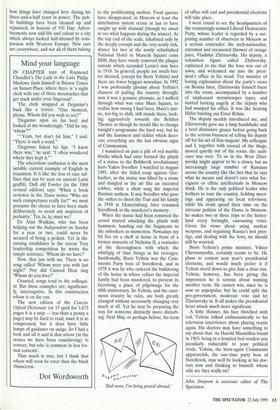Mind your language
IN CHAPTER law of Raymond Chandler's The Lady in the Lake Philip Marlowe finds himself in Bryson Tower on Sunset Place, where there is 'a night clerk with one of those moustaches that get stuck under your fingernail'.
'The clerk snapped at Degarmo's back like a terrier: "One moment, please. Whom did you wish to see?"
Degarmo spun on his heel and looked at me wonderingly. "Did he say, 'whom'?"
"Yeah, but don't hit him," I said. "There is such a word."
Degarmo licked his lips. "I knew there was," he said. "I often wondered where they kept it." ' The who/whom confusion is the most notable current example of English in transition. It is like the loss of case suf- fixes that can be seen on ancient Latin graffiti. Dull old Fowler (in the 1968 revised edition) says: 'When a book reviewer in the Times writes "Who are such conspectuses really for?" we must presume the choice to have been made deliberately, to avoid any suspicion of pedantry.' Tra, la, la; must we?
Dr Alan Watkins, who has been helping out the Independent on Sunday for a year or two, could never be accused of being a pedant. Yet in dis- cussing candidates in the recent Tory leadership competition he wrote the simple sentence: 'Whom do we have?'
Now, that jars with me. There is no song called 'Whom were you with last night?' Nor did Canned Heat sing 'Whom do you love?'
Granted, songs tend to the colloqui- al. But these examples are, significant- ly, interrogative. In this construction whom is on the run.
The new edition of the Concise Oxford Dictionary (at 15 quid for 1,673 pages it is a snip — less than a penny a page) may be hard to read, since it is so compressed, but it does have little lumps of guidance on usage. So I had a look and all it said is that whom (in the senses we have been considering) 'is correct, but who is common in less for- mal contexts'.
That much is true, but I think that whom will soon be rarer than the black rhinoceros.
Dot Wordsworth


















































 Previous page
Previous page